How HBO Created Modern Stand-Up Comedy
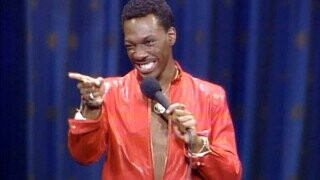
We’ve partnered with the legendary Stand Up! Records to offer three winners each a bundle of four comedy specials on vinyl. Vinyl! Enter below for your chance to win and learn more here.
Does your city have a comedy club? A Chuckle Shack, a Giggle Hut, a Yuk Yuks? The answer is likely yes -- and you might have HBO to thank.
Don't Miss
When HBO launched in 1972, there were only ten major comedy clubs in the entire country. Fast-forward ten years later, and there were more than 400, due in large part to HBO’s commitment to featuring comics like George Carlin, Robin Williams, and Robert Klein in their own stand-up specials.
“HBO’s impact on the world of comedy was unprecedented, elevating the art of stand-up to new prominence,” says James Andrew Miller in Tinderbox, his new oral history of the cable giant.
For 50 years, HBO has driven the comedy conversation in America. Let’s take a look at how a struggling pay-channel jumpstarted cable TV by tickling our nation’s ribs.
The 1970s: It’s Very Racy
You could feel the seismic shift when HBO aired Carlin’s first special in 1978. His infamous “Seven Words You Cannot Say on Television,” a routine that had actually gotten Carlin arrested just a few years earlier, was being delivered on television!
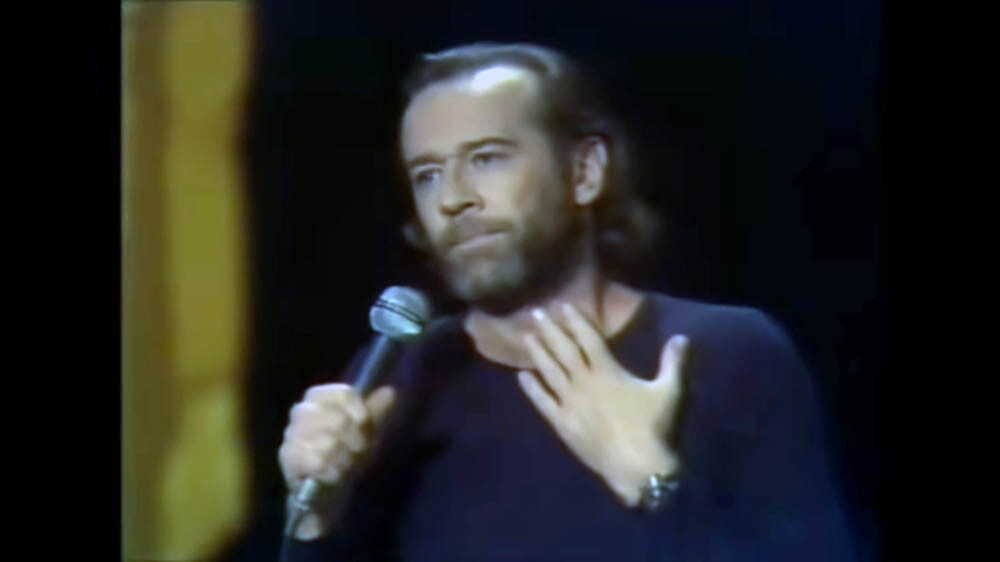
HBO
For comedians, two barriers were obliterated at once. For the first time, adult language was allowed, even encouraged. And comedians claimed the spotlight for an entire concert’s worth of material, not just the five minutes they might get on Johnny Carson.
Robert Klein, who starred in HBO’s very first stand-up special in 1975, remembers the frustrations of both limitations. “When I would appear on The Tonight Show, Merv Griffin, or Della Reese’s Reese, I had only five minutes and every word was parsed,” remembers Klein. “The network wanted to hear everything in advance.”
An HBO special meant tremendous new freedom for comic artists. “My manager at the time … called me and said, “There’s this new thing called HBO, and you can swear and do things you’ve never said or done on television before,” says Bette Midler, another early HBO comedy act. “It’s very racy.”
That Carson gig used to be a wormhole to comedy stardom. But by the end of the 1970s, getting your own HBO comedy special became the new marker of “you’ve made it, kid.”
“HBO’s young comic special was my first time on HBO, and I killed on it,” remembers Richard Lewis. “I had already done some Tonight Shows with Johnny but being on that special was really important to me. HBO was the rocket booster for my career.”
Comedians became rock stars. “Our Steve Martin show caused a f*ing sensation across the country,” says HBO’s Michael Fuchs.
This wasn’t just good for comedy -- it was very good for HBO. There was no other place to see content like this. And to the surprise of the big three networks, people lined up to pay for it.
The 1980s: Magic Nights
As HBO matured, comedians and the channel developed a symbiotic relationship -- a killer stand-up special boosted both the comic and HBO. In 1983, Eddie Murphy (then only 22 years old!) recorded his first special. Talk about a rocket booster -- the ensuing album (Eddie Murphy: Comedian) won a Grammy, and Murphy’s HBO specials inspired a new generation of stand-ups.
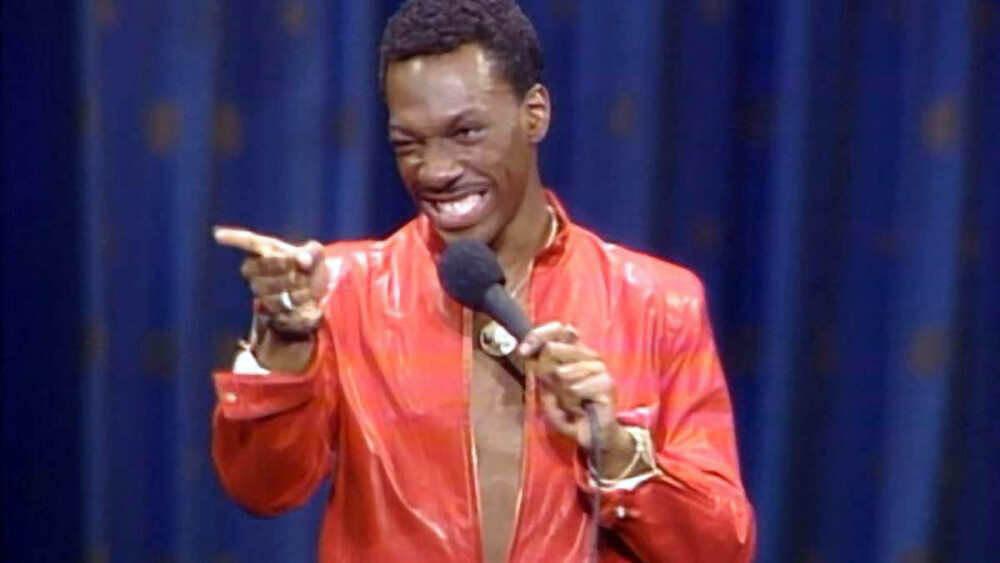
HBO
“Eddie Murphy’s Delirious is the best,” declares Chris Rock. “Nothing had the cultural impact of Delirious. That was the gold standard. I did one of my specials in a maroon suit as an homage to Delirious.”
Rodney Dangerfield and his series of Young Comedian Specials launched a murderers’ row of comedy stars, including Sam Kinison, Jerry Seinfeld, Roseanne Barr, Bob Saget, Rita Rudner, and David Spade. Seinfeld reportedly said appearing on one of those specials was the equivalent of ten Tonight Show spots.
Other comic names got their own turbo boosts: Robin Williams and his Evening at the Met, Whoopi Goldberg’s one-woman Broadway show, Billy Crystal’s set in Moscow when the Cold War was at Reagan-era heights.

HBO
And those three comics teamed up for 1986’s initial broadcast of Comic Relief USA, a fundraiser to help the homeless. “They had us go down to Washington and talk with important figures in politics,” says Whoopi. “It was an amazing awakening for the three of us.”
Billy Crystal remembers: “The three of us wrote the opening, which was six minutes long, and when we came offstage, (HBO execs) met us and said, “The phones are ringing.” Robin, Whoopi, and I started crying.”
“It was one of those magic nights where everything just turned out,” HBO’s Chris Albrecht told The Cable Center. “We did this live show, people were actually donating money, HBO had never done anything like this before.”
The special was also the first professional job for USC undergrad Judd Apatow, who volunteered to work for free. For the next five years, Apatow produced satellite shows at clubs around the country, introducing the comedy mogul to the biz.
The 1990s: Hey Now
As HBO headed into the 1990s, it recognized that while comedy had been very good for the network, success was its own kind of problem. Breakthrough HBO specials launched comics like Jerry Seinfeld and Roseanne into the stratosphere, who then went on to create mega-successful sitcoms … for NBC and ABC.
HBO had missed out on those situation comedies, but that just fueled its desire to instead reinvent the whole genre with The Larry Sanders Show.

HBO
Garry Shandling played talk-show host Sanders, who in turn was based on real talk-show guest host Garry Shandling. The show-within-a-show was innovative enough, with backstage scenes shot on film and talk show segments shot on video. But it was the acidic take on show biz phoniness that caught on with critics and eventually viewers.
“Its most extraordinary invention is in having celebrities basically playing themselves,” says The Guardian. “We see Sanders' paranoia that Dana Carvey will replace him as host, and his wife's jealousy that Mimi Rogers is flirting with him on air. Six years later, Sanders will chase Warren Beatty's car to try to persuade him to appear on the show's finale.”
The idea of a sitcom blurring fact and fiction would show up in many of the top comedies that followed it, including Curb Your Enthusiasm, Entourage, and 30 Rock.
“Larry Sanders was one of the first shows on HBO that opinion makers followed,” says Albrecht. “Garry was a visionary; watching him pull all that together showed a whole other host of people what you could do on HBO.”
The 1990s also gave birth to a fruitful relationship with Chris Rock. His SNL tenure was frustrating, and Rock’s departure for In Living Color was ill-timed as the show was about to be canceled. According to Rock, his career was “totally dead.”
Bring the Pain brought it back to life. His stand-up special, possibly as influential as Murphy’s, took home two Emmys. “My dad said to always assume that life is going to be sh*t; that way you’re happy if it goes well,” Rock told the Hollywood Reporter. “I feel like I won this for all the stand-ups.”
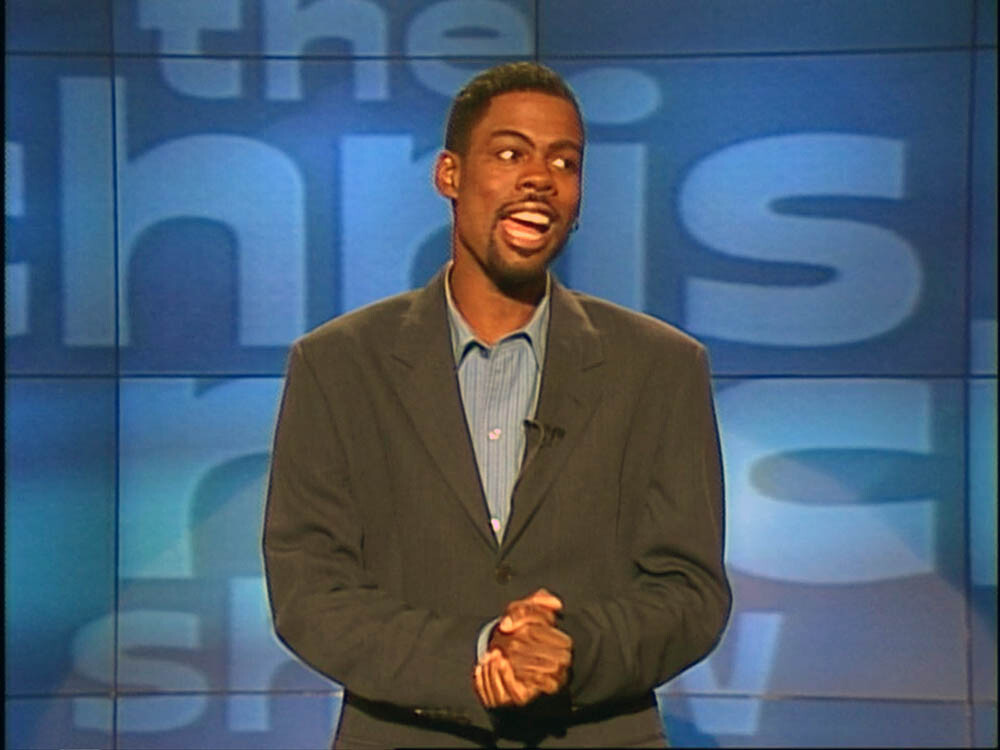
HBO
Pain’s success led to The Chris Rock Show. “I had so much freedom,” Rock told Miller. ”The only time I ever got a call was when I was thinking about having O.J. on. We were going to bill it as a big exclusive, and I was going to start off with, ‘America really wants to know…’ and then only ask him football questions.”
The 2000s: You’re Just Completely Dependent on Being Funny
Comedy specials continued in the 2000s: Louis C.K., Bob Saget, Sarah Silverman, Will Ferrell, Lewis Black, Martin Lawrence, Dane Cook, Ricky Gervais, and Ellen DeGeneres, to name a few.
But competitors were emerging. Showtime, among others, entered the stand-up comedy game and Netflix was lurking. So HBO refocused its attention on comedy of another kind. Check out the Emmy nominations since 2000 -- they’re littered with HBO shows that shaped modern TV comedy: Sex and the City, Curb Your Enthusiasm, Entourage, Flight of the Conchords, Girls, Silicon Valley, Barry, Veep, Insecure and Hacks.
OK, wow. Let’s take a dive into a few of the most influential.

HBO
Sex and the City. “There was one moment where ABC was interested and I asked them, “Could you even call the show Sex and the City?” says the show’s creator Darren Star. “But it was never my intention to bring it to a broadcast network. It was only about going to HBO.”
Only HBO could do the sex part and, ahem, they leaned in. “I knew a Samantha, a Miranda, a Charlotte, and I certainly knew a Carrie,” says Star. “Carrie in a way is a synthesis of all of these women, the questioner or explorer. Her friends are archetypal women.”
The show took a little time to fully find its voice, but after nominations for its first two seasons, it was crowned Best Comedy in its third. The idea of four women taking on the big city continued to reverberate inside HBO, inspiring both Lena Dunham’s Girls and Issa Rae’s Insecure.
“The first time I watched Sex and the City, I was in college, and I thought this feels so relevant to my life,” says Rae. “I want to be Samantha. I feel like Carrie, Miranda. So I hope that people are identifying with our characters in that way.”

HBO
Curb Your Enthusiasm. Originally, David was interested in doing a stand-up special. Part of that show turned into Larry improvising with his comedian friends, a process that was “very appealing to me.”
“There’s no lines to memorize,” David says. “You’re completely dependent on just being funny and moving the story along and to hit the right notes at the right time.”
“The mockumentary part of it became the star,” says Albrecht. And it gave David the leeway to pretty, pretty much do whatever he wanted. As David’s agent said, freedom was more important than money.
Enough freedom to sometimes take years between seasons until David once again felt inspired, but the show continues to rack up awards. With it’s sour protagonist and bitter storylines, the Chicago Tribune credits Curb Your Enthusiasm for paving the way for future black comedies like Arrested Development and It’s Always Sunny.
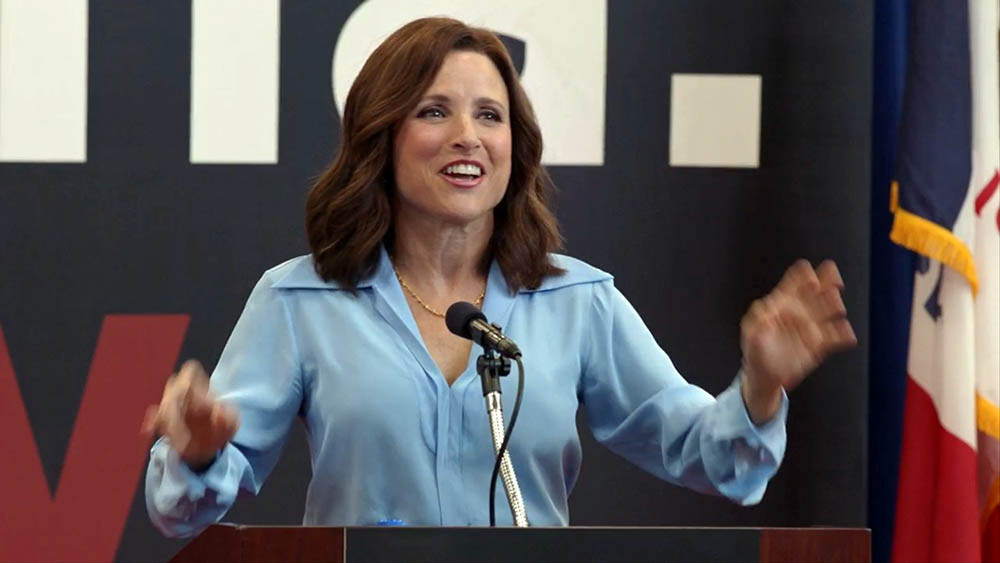
HBO
Veep. Julia Louis Dreyfuss’ first HBO meeting for Veep “just went on and on and on. I was already a pretty politically active person. I also grew up in Washington, DC, so I was very familiar with the culture inside the Beltway,” she says. “A lot of things came out of that conversation that were ultimately in the pilot.”
“I was desperate to get away from network television and on to HBO,” she says. ”There was a dynamic at HBO where people were hired to do their thing creatively and they were fundamentally left alone to do that. That was a complete breath of fresh air.”
“Julia called me the morning of the Emmys and said, “I’m thinking if I win, I’d like you to carry my purse and come up on stage with me,” says Tony Hale, Veep’s Gary Walsh. “I said, “Absolutely,” and bam, she won, and that was quite a rush.”
Based on her six straight Emmy wins (plus the statues she already had on her shelf for Seinfeld and The New Adventures of Old Christine), Veep officially anointed Louis-Dreyfuss as the comedic actress of her generation.

HBO
Barry. Bill Hader and writing partner Alec (Seinfeld) Berg couldn’t find a workable idea for a new show. “Then out of frustration, I said, “Me as a hitman, that would be something,” recalls Hader.
“And Alec said, “I hate that. I hate hitmen.” And then out of nowhere, he said, ‘What if he took an acting class?’ And we both started laughing.”
The show found its mojo with the decision to cast Henry Winkler as Barry’s acting teacher (but only after several auditions). “I wanted to make sure he could play an a-hole,” says Hader. Both men would win comedy acting Emmys.
Despite a recent turnover in creative management, the comedy hits just keep coming for HBO. Hacks just took home the (admittedly tarnished) Golden Globe for Best Comedy. The Other Two looks like a smash. HBO’s 50-year run of leading with laughs doesn’t look like it’s ending anytime soon.
That’s because of the reputation it has built among comedy’s top talents. Particularly when it comes to laughs, says Ricky Gervais, HBO is “the international Holy Grail of quality.”
For more ComedyNerd, be sure to check out:
The Sex and the City' Equation: Four Women You Always Meet in Female-Led Sitcoms
Will Forte: He's Criminally Underrated
Chris Farley And The Comedian Who Ignited America’s First Sex Scandal
Top image: HBO
